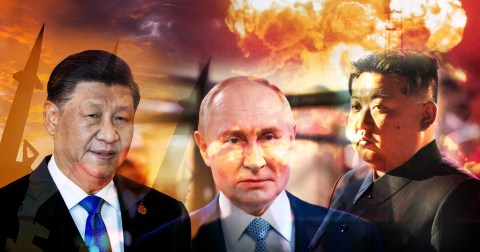Many people worry that we are just one disaster away from World War III as the Middle East conflict escalates to terrifying levels and Putin continues to bombard Ukraine.

Two days after Iran launched a barrage of ballistic missiles at Israel, the region’s long-feared war is getting closer.
In the last 48 hours, a number of evacuation flights have been dispatched, and the majority of Western nations have urged their citizens to leave Lebanon immediately.
Putin continues his relentless air strikes against Ukrainian citizens in Europe, warning the West that they will follow suit if they interfere.
China and the United States are also experiencing an increase in tension, and Beijing is considering an invasion of Taiwan.
Therefore, what are the five factors that have the potential to ignite global war?
Iran acquires nuclear weapons
Tensions in the Middle East are at an all-time high as Israel and Iran launch hundreds of missiles at Lebanon and each other.
Iran’s support for the militant group Hezbollah led to a series of strikes against soldiers who were carrying out Israel’s ground invasion of Iran.
The Guardian stated, “it is hard to be sure the two sides have not already crossed the threshold for “all-out” war” because of the bloody exchanges.
According to Asher Kaufman, a professor of history and peace studies at the University of Notre Dame, a “all-out” war involving Hezbollah and Israel would not only be devastating for both sides but also impossible to avoid involving Iran.
According to Bloomberg, the Western superpower and the United Kingdom are both concerned that Russia is sharing information with Iran in order to assist them in building nuclear weapons. Any direct conflict between Iran and Israel could bring the United States into battle.
Because Iran’s ideology and behavior are so dissimilar to those of other countries with nuclear weapons, the United States has made numerous attempts to prevent the country from developing nuclear capabilities.
Even though a nuclear-armed Iran could deter Israel, the United States would still consider it too big a risk to simply accept, even if that meant going to war in the Middle East.
Putin attacks a NATO nation In 2022, Russia’s invasion of Ukraine started the first war in Europe since World War II.
Since then, air strikes have been conducted against Ukraine, resulting in over 30,000 deaths and no sign of abating from Russian President Vladimir Putin.
Ukraine’s president, Volodymyr Zelensky, has repeatedly warned that Putin will target Ukraine next, which “certainly means the Third World War,” if NATO does not assist his nation.
If the West appears to be providing too much assistance to Ukraine, Putin has warned that they run the risk of incurring his ire.
However, this has not stopped Western powers like Germany, France, and the United Kingdom from sending weapons and supporting their military’s training.
Because of the agreement with NATO, it would only take one attack on any member nation, including Poland and states closer to the conflict, to start an all-out war.
After Russian missiles came dangerously close to his country, Polish Prime Minister Donald Tusk told newspaper network LENA, “We are in a pre-war era.”
Now that Ukraine wants permission to use Western weapons to attack Russian territory, Putin said earlier this year that it would be “one step away from a full-scale World War Three.”
If he succeeds, he will also not stop with Ukraine; the Baltic states will follow “if the alliance is seen as too spineless to stop him,” according to Sky News.
China invades Taiwan
The deteriorating relationship between China and the United States has only gotten worse over time, and it has long been considered the greatest threat to global stability.
Since Beijing considers Taiwan to be part of Chinese territory, the island nation’s sovereignty has been the source of contention between the two nations.
It has even gone so far as to call Taiwan’s leaders “dangerous separatists” and has set a 2027 invasion target for Taiwan.

However, the island has continued to fight for its independence with the financial and military support of the United States.
There are still worries that China will succeed in its invasion plan. admiral John Aquilino stated to the congress that Beijing will increase its army “on a scale not seen since World War Two.”
The United States of America is putting more and more of its resources into bolstering its presence in the Pacific and South China Sea, where the two countries frequently engage in conflict.
According to Foreign Policy, leaders are “one accident and a bad decision away from catastrophic war” and are failing to “grasp the full significance of that militarisation.”
The Times stated, “would be one of the most dangerous and consequential events of the 21st century” if China launched an invasion.
“Make the Russian attack on Ukraine look like a sideshow by comparison,” they added.
North Korea launches a full-scale attack on South Korea. Kim Jong Un, the dictator of North Korea, has warned that the US and its allies’ actions have brought the Korean peninsula to the brink of war.
Earlier this year, North and South Korea started a balloon war, which resulted in trash being dumped over the South. This has raised tensions between the two countries.
It came after activists in South Korea sent balloons to North Koreans living under Kim Jong Un’s harsh dictatorship “carrying propaganda material about their democratic society.”
The South has ended their non-hostility agreement because “psychological warfare had tipped over into real escalation,” and both sides have abandoned plans for any kind of reconciliation.
Across the Demilitarized Zone, the South continues to play K-Pop music to border guards from the North.
Kim Yo Jong, Kim Jong Un’s sister, stated that if the South did not halt its actions along the zone, the North would launch “counteractions.”
The United States has become involved, and in June, for the first time in seven years, it conducted a bombing drill with Seoul as a “warning against North Korea.”
Access to resources has decreased as a result of climate change, and infrastructure has been destroyed by extreme weather events as a result.
Even the United Nations Secretary Generals have raised the alarm, as Kofi Annan stated in 2001: Future conflicts and wars may be sparked by fierce competition for fresh water.
Pope Francis even posed the question a few years ago: Are we not heading toward a global water war if we continue to wage this fragmented Third World War?’
Water consumption has increased at a rate more than twice that of population over the past century, putting cities all over the world in dire need of it.
20 million people across Africa and the Middle East were forced to flee their homes in 2017 as a result of unending droughts, which led to food shortages and conflicts.
By 2030, the drought could cause the displacement of up to 700 million people, according to the United Nations.
As the number of people moving between states and cities soars, so do the chances of conflict.
The United Nations confirmed that water conflicts are likely in 300 areas after analyzing current water availability and future projections.
With hostile states like Iran announcing in January that they had launched three satellites into orbit, countries are now beginning to expand into space.
The vice-chairman of America’s joint chiefs of staff, Admiral Christopher Grady, stated: Space has emerged as our most crucial battlefield.’
Officials in the United States have been alarmed by Russia’s development of a nuclear weapon that can target space-based satellites.
There are thousands of them in orbit, and their implications are numerous: from movies to state surveillance.
Satellites are susceptible to attack, officials at the Pentagon have warned.
China destroyed a defunct weather satellite in 2007 with a missile. Russia struck a dead satellite in 2021.